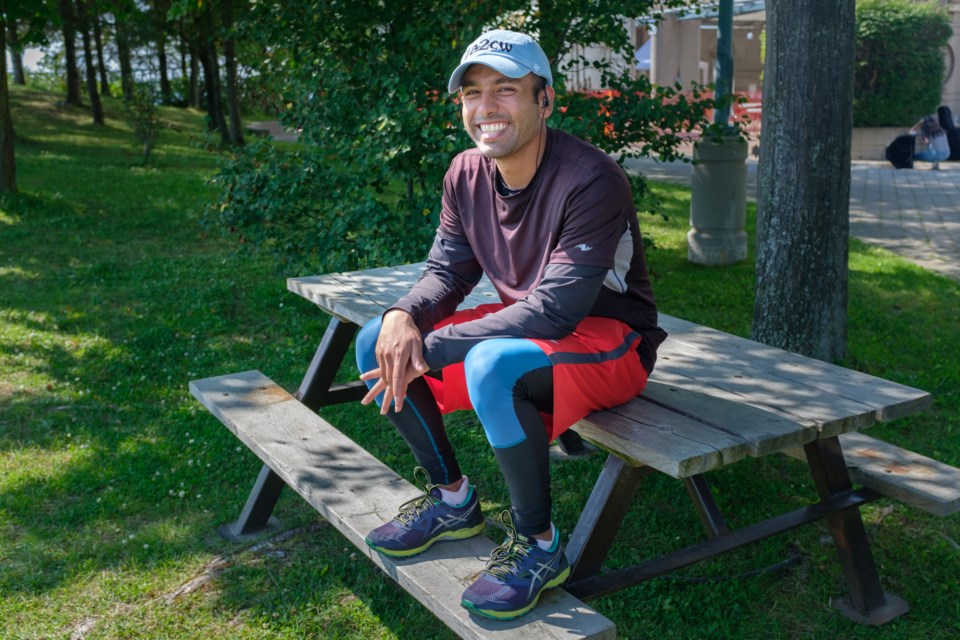Many First Nations communities across Canada have contaminated water running out their taps and Hasan Syed is running across this country to make sure people know something about it.
Well, he was running, now he’s walking, and, it’s only sort of across Canada.
It’s kind of a funny story.
Syed first heard that many reserves were under sometimes decades-long boil water advisories in 2015.
Syed immigrated to Canada from Pakistan when he was 10 years old and he still remembers having to boil water back in Pakistan.
He said he found it strangely primitive for there to be issues with drinking clean water in Canada. “It’s insulting for this to be happening to people here.”
“In Pakistan, we had to pour boiled water through a cheesecloth to make it drinkable. For me, it's like, that happened there but it can’t be happening in Canada. For me, Canada is still my heaven, it allowed me to go to university,” said Syed.
Shortly after, Syed made his plan to run across Canada and raise awareness about the issue and he wanted to do it by finishing the second-half of Terry Fox’s journey, but in reverse.
In April 2017, Syed flew to Vancouver, rented a car, and loaded it with food and camping supplies.
With no idea of what he was doing, he set out on his cross Canada awareness campaign ‘Access 2 Clean Water’.
The idea was to run along the highway while being followed in a car driven by a volunteer and every night camp on the side of the road.
He started at Canada Place in downtown Vancouver, and he didn’t realize that development outside the city sprawled for almost 100 kilometres going west.
He also didn’t know he wasn’t allowed to run on highways.
“On my first day running, at 24 km, the police stopped and told me to get off the highway,” he said. “I thought I’d probably just camp on the road, but there was nowhere to camp.”
Syed was lucky because a local mosque was covering his journey for a small publication and they gave him and his driver a place to stay.
For the first week or so Syed and the driver would go along the highway, drive to the mosque when they were done, and then start back up again in the morning.
The camping started when Syed got to Chilliwack but after his first night he was disheartened to find his olive oil frozen — he didn’t realize how cold it was up in the Rockies in April.
When he got to Kamloops, he lost his driver, another issue.
Syed didn’t realize it would be difficult to get people to follow him around all day in a car.
“I thought I would just pick up people on the way,” he said.
Syed said part of the problem was it very boring for the drivers.
“They would have to drive very slow behind me for 3 hours a day, it was difficult at a slow pace,” he said.
Without a driver, Syed had to drive his car himself to carry all the supplies but by doing so that would cancel out his whole cross country running plan.
He says that at tough times like this, his Canadian Military Reserve Force training kicked in.
“That’s where I learned the mental skills, the willpower, and toughness to persevere,” he said.
He came up with a creative solution.
Syed said he was still going to travel across Canada, he was still going to be able to do it alone, but in a totally different way.
From then on in he drove from town to town and when he stopped he would just run the amount of kilometres that is equal to the leg of the journey he made, but in a loop in that town.
He also switched to mostly walking now — he averages around 20-30 km a day — and he relies mostly on hosts for his journey.
So, at the end of the journey, Syed won't have travelled almost any highway kilometres but will have visited different towns and travelled the same number of kilometres he would had he made the journey from Point A to Point B.
It actually might be more kilometres because he said his odometer watch malfunctioned and said he did fewer kilometres then he really did so now he just uses a cellphone.
Oh, and there is still another change.
At some point on his journey Syed decided he wasn’t going to just travel the 3,000 km to Thunder bay, but go an extra 1,500 km to Ottawa and try to have a meeting at the House of Commons.
On Sunday Aug. 13, Syed was in the Sault on that added stretch of the journey.
He still hasn’t got the meeting in the House of Commons set up yet but he hopes MPs will see what he’s doing and support him.
According to an informational package put out by Access 2 Clean Water:
- As of Oct. 31, 2016, there are 133 drinking water advisories in effect in 90 First Nations communities across Canada
- Some First Nations communities have had Boil Water Advisories for over 20 years: Neskantaga First Nation since 1994, and Shoal Lake 40 First Nation since 1997
